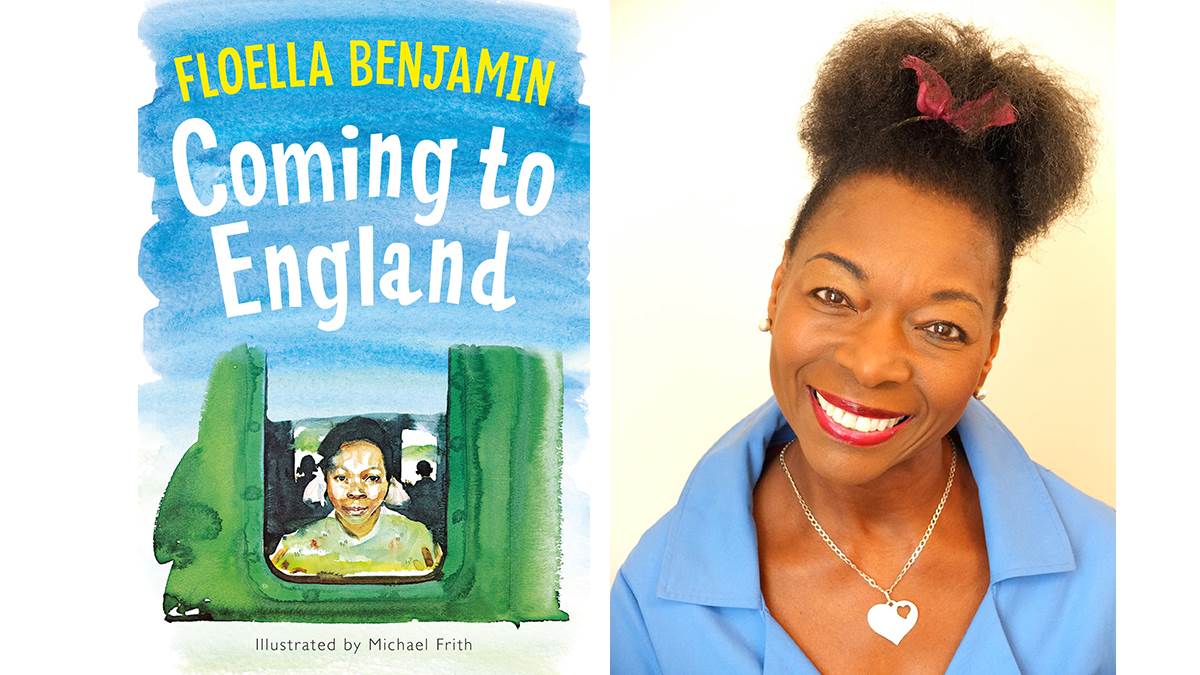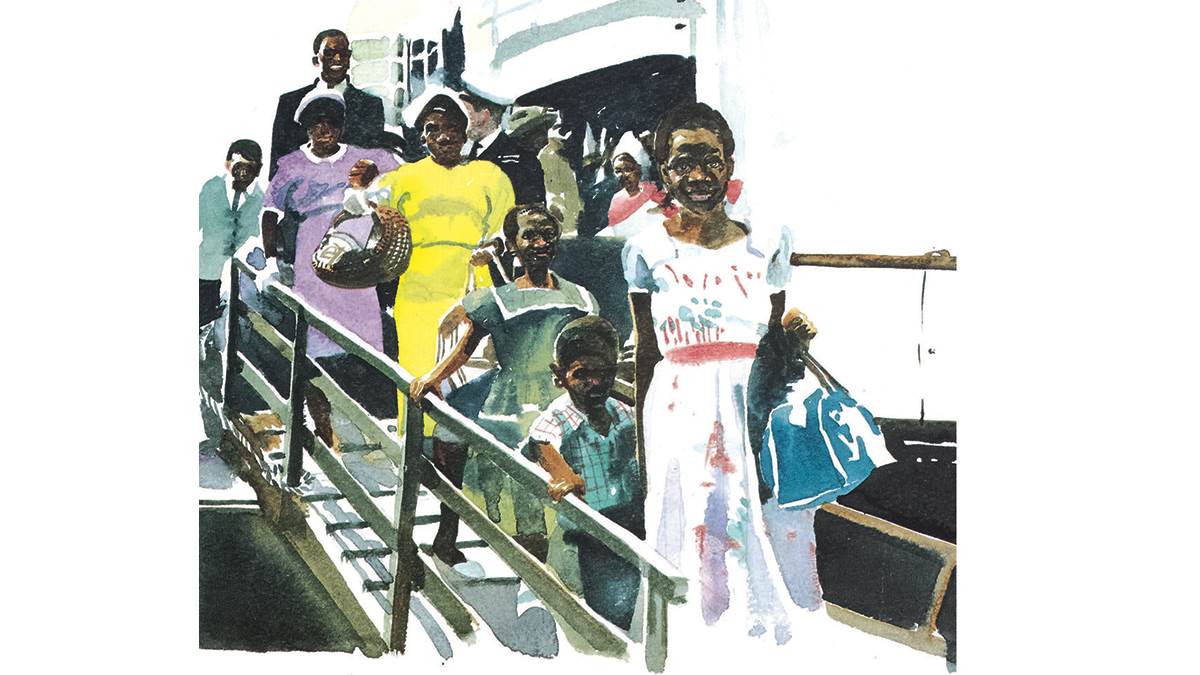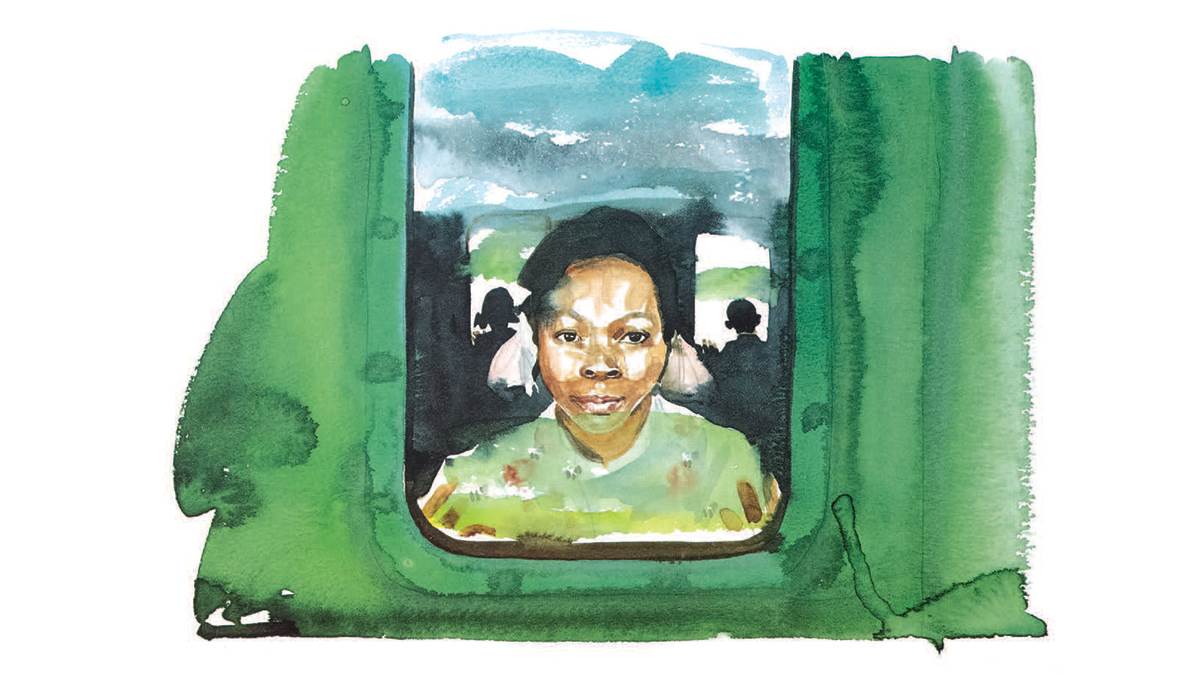Floella Benjamin on Coming to England and its impact 20 years on
Published on: 11 October 2016 Author: Emily Drabble
Baroness Floella Benjamin's iconic children's book Coming to England has been republished by MacMillan (with beautiful illustrations by Michael Frith) to celebrate the book's 20th anniversary.
Here Floella tells us how she wrote her moving memoir about her family's move from Trinidad to England in 1960 - and why she thinks books and stories have the power to change children's lives.

What triggered you to write Coming to England?
It was my children. They asked me, 'What was it like when you were little, mum?' and I looked around for a book that would be depict my childhood; coming from two cultures and moving to England from a new land. I couldn't find anything that would tell the story so I decided to write the book myself.
Then I met Colin Webb who ran Pavilion books at an awards ceremony in 1994 and told him I'd love to write it and he said he would publish it if I did.
Why did you think it was so important to tell your story at that time?
I knew there were lots of people like me. I was one of hundreds of people whose parents left them in the Caribbean when Britain begged adults to come and help rebuild the country after World War Two - and told them, 'You're wanted in the Motherland'.
I was so lucky my parents only left me for 15 months. Some children's parents left them for 15 years, some never came back. The parents were so busy making a life for themselves and their children's future that they didn't realise what their children were going through back in the Caribbean - I wanted to tell the story of the child, me.
It took me two years to find the voice I wanted to tell the tale. I went back to the Caribbean and it didn't happen. Then I went to our house which is in the middle of a forest, and I sat there one night at 11 o'clock with pen and paper (I always write with pen and paper) and started writing when everyone else had gone to bed.
My memories came flooding back. Suddenly I was three years old again - and for the next four hours I was in that zone. I started writing page after page, tears rolling down my face as the memories were coming back.
I read it to my children when they got up in the morning and they started to cry too. Suddenly I was not like their mum anymore and they saw me as a three- or four-year-old child. Then I finished the book in six weeks, two years after I started writing it.

When you were growing up presumably there were no black characters in the books you read. Did you consciously notice that?
When we were very young my father used to make up stories for us. He used to tell us to imagine what it was like. He instilled that skill in our brains and opened our minds to see the bigger picture. So in a way it didn't matter that there were no black characters in the books I read - I filled in the gaps with my imagination.
But I understood even then that it did matter to people who didn't have that kind of parent. With Coming to England I was trying to open children's minds and children from all backgrounds seem to love it.
Diversity and race
Coming to England was one of the first books with diverse characters published in the UK. Why do you think it took so long - and are we there yet?
We've got a long way to go. I think publishers need to understand everybody's tale and story has significance. Just because a story has a black main character, it doesn't mean it's a black book for black people. I know that's true because of my experience; people of all colours say to me, 'That's me in your book'.
Britain has always been a nation that's evolved due to different races coming in, from as far back as you can go. I hope Coming to England makes people of colour feel worthy, appreciated and that they belong and that it makes white people say, 'That could be me, what would it be like if I moved somewhere else?'
The racism in England you encountered in the 1960s feels very shocking to many children reading Coming to England today. What reaction have you had from the book over the years, and how has that changed?
I know a lot of readers are shocked and saddened by the racism in the book. When we made the film of Coming to England in 2002, the white actors playing the roles of neighbours from hell and people who shunned us cried in rehearsals. But the racism I encountered made me so determined to break down the barriers.
I met one of the women who was really horrible to our family. Years later in a shopping centre she recognised me and told me, 'I'm your neighbour from hell - please, please, please forgive me.' I told her there was nothing to forgive, that she made me strong and who I am today. I tell people who face adversity: adversity can break you or make you stronger, make sure it's the latter.
Some people saw it as an important book from the start. Broadsheet newspapers hailed it as a classic and said it would be on bookshelves with Huckleberry Finn forever. But other people felt it was nothing to do with them - 'It's a black story, isn't it?'
I was so pleased when an academic from Durham University wrote a paper on Coming to England and said it was one of best books on racial equality and diversity. If people understand my book they will understand how we can make a difference to our society. And I think the story is so pertinent now with people asking what migration means to this country.

Reading
What advice do you have for parents on how to help their kids love reading?
Ideally it all starts when children are really young. When someone has a baby I always give them a bag of books. So my first advice is when you want to give them a present, make it a book. I really feel BookTrust does a really important job for parents to open up their minds to the world of books with book-giving - and beyond!
Always make sure you have time for your child at bedtime so they're tucked in bed and have had a bath and they start with a story. Either make up the story, or have a book so they can turn the pages. You'll get to the point when even if they can't read they'll know if you've missed a page because they know the story off by heart.
If you get bored with telling the story one way, next day tell it with a different voice. Ask questions - 'When I turn the page, what will happen next?' Some parents might be dyslexic and can't read - but if that's you, don't worry, you can still tell a tale. It doesn't mean you're a lesser person if you can't read and you mustn't be afraid. If parents have been told they're no good at reading or they feel inadequate, work hard not to pass that onto your children. Talk through the pictures. Do a drawing, do anything that will get a child to start loving stories and being creative and the art of words.
Can you give us some tips for reading a book out loud?
I think what parents with low confidence should do is prepare. They should take the book to bed themselves or on the loo and read it out so they can hear what their voice sounds like out loud. Once you hear your voice, you start getting confident. When you've done your rehearsal - you can get on with the reading to your child! The child will look at the parent with great admiration and think, 'Wow, my mum can really tell a story' or, 'My dad's reading makes me laugh so much!'
You're making your children feel a sense of pride looking up to you. What a gift you can give your children - and then they will pass it onto their children when they have their own kids. It's a rich legacy but it doesn't cost any money. If your parents didn't read to you, break the cycle now.
Is there a children's book you want to recommend to us today?
I love reading Shirley Hughes' Alfie books out loud to younger children and The Very Hungry Caterpillar by Eric Carle and Eric Hill's Spot books (I'm a big fan of flap books). For older children I love Roald Dahl. I recently read James and Giant Peach out loud at a festival and the whole audience were mesmerised. I brought each insect to life - and I made the centipede Caribbean.
Coming to England by Floella Benjamin is published by Macmillan Children's Books. Teachers' resources are available from the Pan MacMillan website.
Topics: Interview, Diversity (BAME), Features





